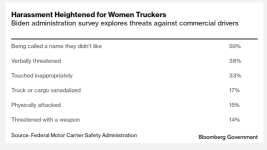- Joined
- Oct 30, 2022
- Messages
- 55

The Nature and Frequency of Harassment Against Truck Drivers
Harassment against truck drivers is prevalent. Being called undesirable names (59 percent of
women, 52 percent of minority males, and 51 percent of non-minority males) and receiving
threatening words (38 percent of women, 40 percent of minority males, and 44 percent of non-
minority males) are the most common forms of harassment. Relative to men (8 percent of
minority and 14 percent non-minority), women truck drivers (33 percent) are exposed to more
sexual harassment
Characteristics of the Aggressors
The individuals committing the harassment are more likely to be other truck drivers whom the
victims did not already know (e.g., 31 percent of women, 27 percent of minority male, and 34
percent of non-minority male truckers who were victims mentioned that the perpetrator was
another truck driver whom they did not know before). Relative to males, women truck drivers
are more likely to experience harassment from another truck driver at their company (15 percent)
or their trainers (11 percent).
- Women are more than three times as likely (OR=3.1, 90 percent CI (2.0, 4.69)) to report being touched without permission (Q18) as non-minority males.
- Women are only 60 percent as likely (OR=0.63, 90 percent CI (0.42, 0.95)) to report having their trucks vandalized as non-minority males (Q15).
- Women are only 50 percent as likely (OR=0.52, 90 percent CI (0.34, 0.80)) to report being threatened with a weapon (Q17) as non-minority males.
- Minority males are also less likely to have experienced at least one instance of physical harm (Q16) (OR=0.42, 90 percent CI (0.21, 0.78)) and touch without permission (Q18)
(OR=0.44, 90 percent CI (0.23, 0.80)) than non-minority males.
The Biden administration, seeking to bolster an industry that carries more than two-thirds of US freight, wants to improve the trucking career for women. The trouble is, many of the female truckers now on the roads face a disproportionate amount of sexual harassment.
The Federal Motor Carrier Safety Administration is gathering truckers, companies and others in industry to come up with solutions to what the agency’s head, Robin Hutcheson, calls “the problem of sexual assault and harassment of women in the industry.”
Female truckers experience more sexual harassment than men and about half of harassment incidents go unreported, according to the survey the administration unveiled last month.
Women of Trucking Advisory Board will focus on solutions to retain and recruit drivers into the industry
"America needs truck drivers like never before, yet women--half the American people--have long been underestimated and underrepresented behind the wheel and in jobs across this sector. Getting to know women in trucking, I have heard about their passion for the job as well as the challenges they face, and this experienced Women in Trucking Advisory Board will help us address these issues directly," said U.S. Transportation Secretary Pete Buttigieg. "We thank the members for serving and look forward to working together to bring more women into trucking and to enhance job quality in this important career.”
WOTAB will coordinate with trucking companies, nonprofit organizations, and trucking associations to support women in trucking. The Board will provide recommendations to the FMCSA Administrator and the U.S. Secretary of Transportation, as well as tackle many issues, including:
- Evaluating barriers and trends that impact women in trucking across the country and ways to support women pursuing careers in trucking
- Identifying opportunities to expand roles for women and increase the number of women in the trucking industry
- Advising on policies that provide education, training, mentorship, or outreach to women in the trucking industry
- Reviewing opportunities to enhance safety, training, mentorship, and education for women in the trucking industry.
Biden-Harris Administration Takes Significant Step to Bring More Women into Trucking | FMCSA
Women of Trucking Advisory Board will focus on solutions to retain and recruit drivers into the industry
Last edited:
